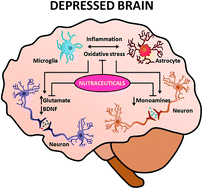Nutritional strategies for dealing with depression
Abstract
Depression is a highly recurrent and debilitating psychiatric disorder associated with multicausal origins. Impairments in the monoaminergic transmission, increased glutamatergic excitotoxicity, neuroinflammation, oxidative stress and deficits in neurotrophic factors are the main hypothesis raised in order to explain the etiological basis of depression. Although the current antidepressant therapy usually alleviates symptoms and prevents recurrence of episodes, the delay in the onset of the therapeutic effect and the refractory or intolerant responses exhibited by a large number of patients are the main drawbacks of the current therapy. For these reasons, several studies have dealt with the investigation of alternative therapeutic approaches or adjunctive strategies which could improve clinical outcomes. One potential adjunctive treatment with conventional antidepressants involves the use of nutraceuticals (a food, a part of a food, a vitamin, a mineral, or a herb that provides health benefits). In this review, we will focus on the main nutrients, phytochemicals and food that have been shown to have beneficial effects against depression.


 Please wait while we load your content...
Please wait while we load your content...